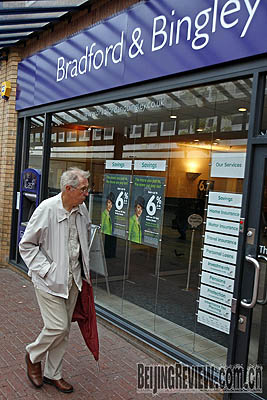|
 EUROZONE SUMMIT: French President Nicolas Sarkozy (left) talks with European Commission President Jose Manuel Barroso (second left), European Central Bank President Jean-Claude Trichet (second right) and Eurogroup President Jean-Claude Juncker before an October 4 summit in Paris
EUROZONE SUMMIT: French President Nicolas Sarkozy (left) talks with European Commission President Jose Manuel Barroso (second left), European Central Bank President Jean-Claude Trichet (second right) and Eurogroup President Jean-Claude Juncker before an October 4 summit in Paris
The U.S. financial crisis spread to Europe in late September, leading many financial institutions to the edge of bankruptcy. Consequently, European Union (EU) countries held a series of meetings to consider how to respond. Now the most pressing challenge for the EU is surviving the financial crisis.
The impact of the U.S. financial crisis on Europe has been slow but destructive. In mid-September, the U.S. subprime mortgage crisis that began in 2007 progressed into a full-blown financial crisis, sending the American economy into a tailspin.
On September 20, the U.S. Government submitted a $700 billion rescue plan to Congress, triggering furious discussions over its proposals and another sharp drop in the stock market when Congress initially rejected it. Even though President George W. Bush signed a revised version of the plan into law on October 3, the financial crisis has cast a dark cloud over the U.S. economy.
While the United States was sweating over its financial future, its European allies displayed coolness, even schadenfreude. German Chancellor Angela Merkel claimed the U.S. financial crisis and the resulting global financial turbulence had limited impact on Germany, and described as "bearable" the losses suffered by the German financial sector after U.S. investment bank Lehman Brothers went bankrupt. German Finance Minister Peer Steinbrueck also said that although the United States was experiencing its worst financial crisis in decades, it would not likely trigger a domino effect in Europe-especially not in Germany, its largest economy. Meanwhile, French Finance Minister Christine Lagarde said the crisis would have limited impact on the French financial sector. This excessive optimism prevented European countries from taking early action against potential financial turmoil at home.
The crisis reached Europe in late September, felling large financial institutions like the British bank Bradford & Bingley, the Belgian-French Dexia Group, and Fortis, the Dutch-Belgian financial services company. Attracted by the prosperous U.S. real estate market and vigorous financial trading in recent years, these institutions had purchased a large amount of "poisoned" securities backed by bad mortgages. The U.S. financial crisis caused them huge losses and they now face serious financial problems. According to an October 13 Wall Street Journal report, the 30 largest European financial institutions hold over 1 trillion euros in debt that will mature by the end of next year, putting their solvency at risk.
 MONEY TROUBLES: A man walks into a Bradford & Bingley bank in Birkenhead, northwest England on September 29
MONEY TROUBLES: A man walks into a Bradford & Bingley bank in Birkenhead, northwest England on September 29
Infected by the financial crisis, Europe is watching its real economy tumble as well. According to Eurostat, the Eurozone's GDP in the second quarter saw negative growth compared to the first quarter. The financial crisis will intensify the credit crunch, depressing production as well as individual consumption. The global economic slowdown will harm European exports as well. In September, Eurozone economic confidence hit a seven-year low as officials reported the unemployment rate had increased to 7.5 percent. The EU and its members are scaling back their growth projections, while the largest European countries face the increasing possibility of recession.
EU bailout plan
Because European leaders misjudged the U.S. financial crisis in the beginning, they were caught unprepared when it arrived on their doorstep. The EU's bailout process can thus be divided into two stages.
|
